Thursday, June 9, 2016
For several years, the propane industry has been locked in a fight against natural gas expansion into rural propane territory, and the state of Michigan is a prime example. More than 80% of the homes in the state are already piped for natural gas, but Michigan Propane Gas Association executive director Derek Dalling says that 80% is not enough for the natural gas industry there. 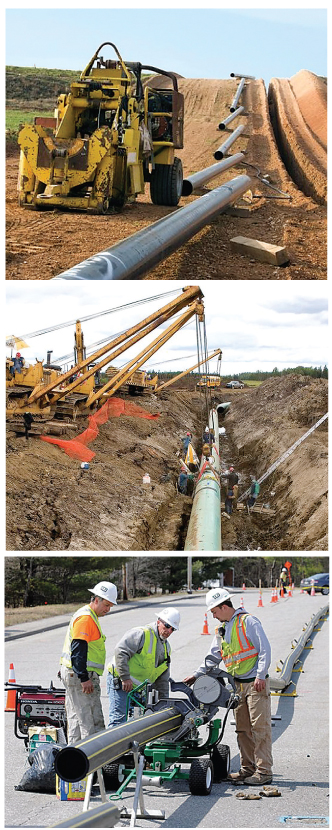
“They need and want to have the rest,” Dalling stated in a presentation at the National Propane Gas Association (NPGA) Southeastern Convention in April. “In testimony, [the natural gas industry] said they represent four out of five people in the state, and they want the fifth one. That is their aim, to put you all out of business.”
The Southeastern session, titled “Playing on an uneven field, combating natural gas expansion in your state,” also included Steve Ahrens, executive director of the Missouri Propane Gas Association (MPGA); and Aaron DeWeese, executive vice president of the Illinois Propane Gas Association, who discussed natural gas utilities’ efforts to expand in their states. NPGA general counsel Jeff Petrash, NPGA director of state affairs Lesley Garland, and NPGA vice president of communications Mollie O’Dell also spoke at the session about NPGA’s state engagement initiative and other efforts to stop the expansion.
NPGA has been working on the issue for about three years. Petrash noted that the pressure receded during the Polar Vortex winter of 2013-2014, when the natural gas industry had as tough a time as the propane industry, although the propane industry’s supply problems received more attention. Once the troubles of that winter receded, the natural gas expansion efforts have “come back with a vengeance,” Petrash explained, adding that he, Garland, and O’Dell have been working almost full-time on the issue this year. The natural gas industry trade association began with no staff dedicated to expansion but now has three full-time staff members.
Petrash’s research shows that the natural gas expansion efforts are in play in 37 states. However, it appears differently in each state, through the state legislatures or through the public utilities commissions (PUCs). Dalling and his team in Michigan have fought the issue through the state legislature; Ahrens and the propane industry in Missouri have fought it through the public utilities commission, and DeWeese and his team in Illinois have fought it through both. In addition to those three states, NPGA has been engaged on the issue in Alaska, Washington, Oregon, New Mexico, West Virginia, Virginia, Maryland, Indiana, Ohio, Wisconsin, Minnesota, North Dakota, Pennsylvania, and others.
To approve expansion of natural gas lines into rural territory, most state PUCs require a utility to show that an expansion is economic and that the revenue stream will cover the cost of the facilities. If the gas utilities don’t feel they can make that case with PUCs, they often go to the legislature, which is probably an easier sell for them, Petrash noted, adding that state legislators are “entranced with shale gas.” Although shale gas has been great for increasing the supply of natural gas and propane, that is only a small part of the equation involved with expanding the reach of natural gas.
“The analysis really has to do with the fact of how much does it cost to put the infrastructure into the ground, and can you ever recover that,” he said. “And in almost all the instances that have come to our attention, the economics don’t work. Because if they did work, the utilities would have done it in the past.” The natural gas utilities are looking to expand burner tips, because like the propane industry, they are experiencing declining consumption per residential customer. In many states, they want someone else to pay to make an uneconomic expansion economic. They have decided not to deploy their own capital, instead asking gas customers or taxpayers to subsidize their capital investment in uneconomic expansion.
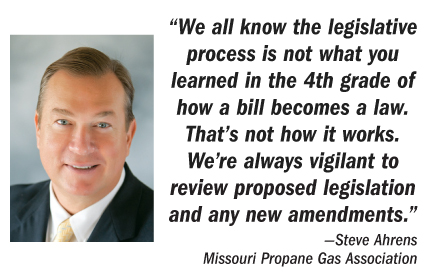
According to Ahrens, Missouri hasn’t seen legislation like other state associations are fighting, but his association is keeping an eye out for it. “We all know the legislative process is not what you learned in the 4th grade of how a bill becomes a law,” he explained. “That’s not how it works. We’re always vigilant to review proposed legislation and any new amendments.” Ahrens has served with representatives of the natural gas industry on a governor’s energy task force, and he has learned that extending natural gas pipeline throughout Missouri is the “stated goal” of those representatives.
Beyond its legislative focus, for which the association employs a full-time lobbyist, Missouri is also engaged at the regulatory level. MPGA hired an attorney who formerly served on the Missouri Public Service Commission (PSC) to advise on natural gas regulatory policy. The association has also recently filed a complaint against one natural gas utility, alleging that the company is violating its tariff and a separate 2014 stipulation regarding the conversion of vent-free appliances. “We have been engaged in mediation, but with no resolution possible, the case is moving on to the full PSC,” Ahrens said.
In Illinois, DeWeese is seeing similar intrusion by the natural gas utilities. Natural gas companies Nicor and Ameren Illinois have had a cozy relationship with the Illinois Commerce Commission (ICC) for decades, he noted. DeWeese cited the Illinois Natural Gas Consumer Safety and Reliability Act of 2013, which allows the utilities to charge a surcharge of about 75 cents per month for each customer to replace aging pipelines. That might not seem like much, but if you add that up, it results in an estimated annual gain of about $175 million for Nicor and $54 million for Ameren. And even through the money is not allowed to be used for expansion, it frees up other operating capital that can be used for that purpose.
To advance its agenda, the natural gas industry has been constantly bringing up the propane industry’s winter problems of 2013-2014 as the norm. In ICC case testimony for natural gas expansion, Nicor quoted propane prices at $4 to $5 per gallon. “They were saying a residence could save up to $2000 per year on their heating bills and that propane was unreliable, that it wasn’t safe,” DeWeese noted.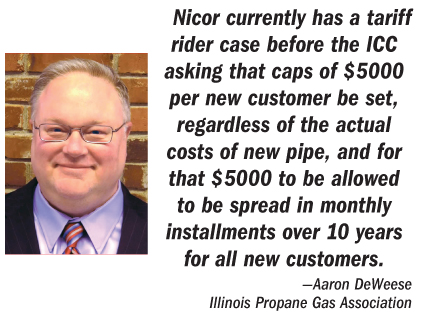
According to DeWeese, Nicor currently has a tariff rider case before the ICC asking that caps of $5000 per new customer be set, regardless of the actual costs of new pipe, and for that $5000 to be allowed to be spread in monthly installments over 10 years for all new customers. IPGA, through its new regulatory attorney, has filed intervening testimony in the case.
ICC already allows an excessive 200 feet of free main for each new customer in Nicor’s current tariff rider. Since 2015, Ameren Illinois has made quick work converting propane customers to natural gas, thanks in large part to the ICC now allowing Ameren to offer a national high 400 feet of “free” main to new customers. Free in this case means expansion costs are being subsidized by current rate payers via their monthly utility bills with the blessing of the ICC.
DeWeese noted natural gas enjoys a favorable regulatory environment in part because propane is not even on the radar with most government regulators. “The ICC is picking winners and losers, with little regard for propane,” he said. In DeWeese’s opinion, it is up to state associations to develop lines of communication with utility commissions to ensure the propane industry’s voice is being heard and to refute any misinformation about propane being promoted by public utilities as they continue pushing natural gas expansion further into propane country.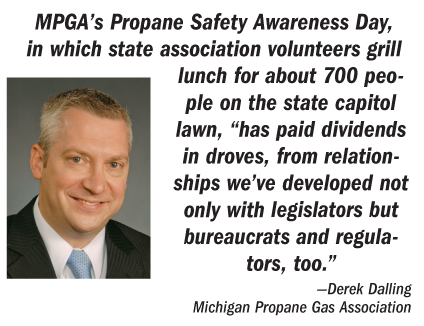
Dalling in Michigan noted his association successfully defeated a natural gas expansion bill, but the association is now fighting a new version of the bill. NPGA has stepped in to help with an advocacy grant.
Natural gas pipes in Michigan are leaking, and that industry’s solution is to get people to pay for new infrastructure. The advocacy grant helped the state association produce a video to promote its cause, which Dalling played in part at the Southeastern session.
“Our utilities, with the help of some legislators, want to build new pipelines out to rural Michigan and let their existing gas customers pay for it,” says the narrator in the video. “Why build new pipes out into rural Michigan? Especially at a time when our old gas pipes are killing people. Since 2004, Michigan has had over 40 disastrous natural gas leaks. And that problem won’t go away here in Michigan. According to government records, our state has some of the oldest leaking pipes in the nation. We have hundreds of miles of rotting cast iron and bare steel pipes; some of it is over 100 years old. To find disastrous gas leaks that have happened in your area, go to migas options.com and click on ‘gas explosions.’” Dalling confirmed that environmental groups in the state became an ally of the state association after the release of the video. The legislation remained in house committee as of press time.
The migasoptions.com site has been helpful in supporting grass-roots efforts in Michigan and combating claims from natural gas advocates. Examples of messages on the site include “Michigan natural gas customers should not have to pay for gas lines built out in the country” and “Relying too much on natural gas severely limits Michigan’s energy options.” The site includes a Detroit Free Press article with the statement, “Existing natural gas pipelines leaking at alarming rates.”
Dalling stressed the importance of industry engagement on the issue, noting that in Michigan alone, the two main utilities are spending more than $1 million this year in electric and natural gas lobbying. He mentioned his association’s Propane Safety Awareness Day, in which state association volunteers grill lunch for about 700 people on the state capitol lawn.
The event, Dalling noted, “has paid dividends in droves, from relationships we’ve developed not only with legislators but bureaucrats and regulators, too. We cannot stress enough doing days like that.” He added that propane marketers should invest in their state political action committees, the NPGA political action committee, and in sending staff to industry meetings.
Dalling also wrote a May 9 letter addressed to the Propane Education & Research Council (PERC), asking for a PERC-driven nationwide response on natural gas expansion. “MPGA is not asking for PERC to lobby,” he wrote. “Rather, the [association] firmly believes that PERC can and should create a consumer education campaign as a single, consistent, and nationwide response to the aggression from the natural gas industry.”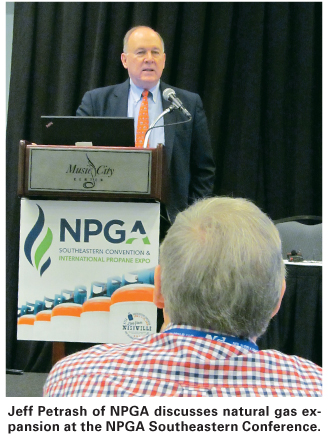
He added that NPGA was also helpful in combating natural gas expansion legislation in Michigan. Garland talked about NPGA’s state engagement initiative, which the association’s board approved in June of last year to provide political, logistical, and financial assistance to states with significant legislative or regulatory issues regarding natural gas expansion efforts. So far, NPGA has supported efforts in Minnesota, Michigan, Illinois, New Mexico, and Maryland, and provided additional grass-roots assistance in Wisconsin and through the Propane Gas Association of New England in Connecticut and Vermont.
Garland discussed a successful effort in New Mexico, describing it as a “true David and Goliath story.” In January of this year, the New Mexico state legislature introduced two bills to allow subsidized natural gas expansion into unserved or underserved areas for economic development purposes. She provided NPGA’s natural gas kit to the New Mexico Propane Gas Association (NMPGA) lobbyist. Association members in the state generated more than 2000 emails to legislators in about two weeks.
“When their email box fills up, they start to notice,” Garland explained. At a committee meeting, a New Mexico legislator said she received dozens of emails in opposition of the plan and none in favor. O’Dell of NPGA noted that NPGA spent $10,000 to $15,000 on radio and digital ads that asked why rate payers in urban Albuquerque and Santa Fe should pay for expansion.
“We wanted to frame it as an ‘everyone’ issue,” O’Dell explained. “Not just about propane retailers who weren’t getting a fair shake at this. This now has to do with everyone in New Mexico.”
She showed a customized brochure that the lobbyist placed “on every single legislator’s desk in New Mexico” with the tagline, “A Costly Conversion?” Although the efforts helped defeat the two bills, O’Dell pointed out, “We won for this year, but we know it’s coming back. This is not something that requires a lot of money on the public side of things. You can make a difference without having to use all of your dues money and your operating budgets. We want to be able to help you on this.”
NMPGA president Billy Romero of Rio Grande Propane told BPN that he and association members, with NPGA’s help, rallied together to defeat the bills. The bills passed the first committee vote, but by the time it went to the second committee, Romero’s group had already placed a radio ad, he had written letters in the Albuquerque Journal, and his group appeared before committees to explain that the propane industry in New Mexico wanted a level playing field. Complicating matters, AARP and the Albuquerque Chamber of Commerce supported the legislation.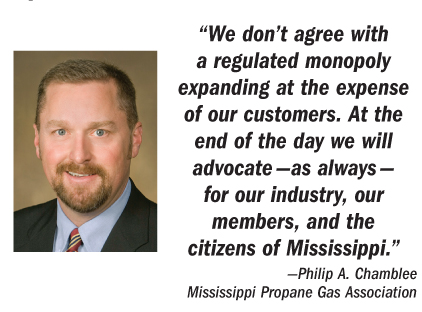
“We just all rallied, a lot of small marketers and the majors got together, and this was during our busiest time of the season,” he added, noting that debate took place in January and February of this year. “One of the interesting things was how misinformed the legislative body was on how this would affect the consumers out there and how uninformed a lot of the consumers were. It was unfair for us as a business that we cannot extend our costs to expand our businesses on to other customers. The bill was focused on them recovering their investment to extend those costs to their existing customers throughout the state.”
The Mississippi Propane Gas Association is also addressing natural gas expansion efforts, especially in the northern part of the state, and the association plans to be more aggressive in its efforts next year, association executive director/lobbyist Philip A. Chamblee told BPN. “We don’t agree with a regulated monopoly expanding at the expense of our customers,” he noted. “At the end of the day we will advocate —as always — for our industry, our members, and the citizens of Mississippi.”
Petrash of NPGA declared during the Southeastern session in April that the propane industry had stopped expansion bills in Virginia and Maryland. “We are told that the utilities are hopping mad at us over that.”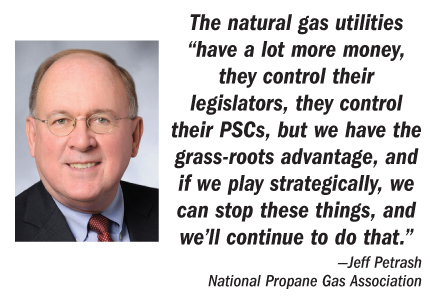
“And in every one of these instances, it took you all,” he reminded propane marketers and others in attendance at the session. “We talk with legislators, they’re glad to talk to us, but they really want to talk to you. You are the people who vote in their districts.”
The propane industry can mobilize grass-roots efforts in a way the gas utilities can’t, Petrash added. “They have a lot more money, they control their legislators, they control their PSCs, but we have the grass-roots advantage, and if we play strategically, we can stop these things, and we’ll continue to do that.” —Daryl Lubinsky

“They need and want to have the rest,” Dalling stated in a presentation at the National Propane Gas Association (NPGA) Southeastern Convention in April. “In testimony, [the natural gas industry] said they represent four out of five people in the state, and they want the fifth one. That is their aim, to put you all out of business.”
The Southeastern session, titled “Playing on an uneven field, combating natural gas expansion in your state,” also included Steve Ahrens, executive director of the Missouri Propane Gas Association (MPGA); and Aaron DeWeese, executive vice president of the Illinois Propane Gas Association, who discussed natural gas utilities’ efforts to expand in their states. NPGA general counsel Jeff Petrash, NPGA director of state affairs Lesley Garland, and NPGA vice president of communications Mollie O’Dell also spoke at the session about NPGA’s state engagement initiative and other efforts to stop the expansion.
NPGA has been working on the issue for about three years. Petrash noted that the pressure receded during the Polar Vortex winter of 2013-2014, when the natural gas industry had as tough a time as the propane industry, although the propane industry’s supply problems received more attention. Once the troubles of that winter receded, the natural gas expansion efforts have “come back with a vengeance,” Petrash explained, adding that he, Garland, and O’Dell have been working almost full-time on the issue this year. The natural gas industry trade association began with no staff dedicated to expansion but now has three full-time staff members.
Petrash’s research shows that the natural gas expansion efforts are in play in 37 states. However, it appears differently in each state, through the state legislatures or through the public utilities commissions (PUCs). Dalling and his team in Michigan have fought the issue through the state legislature; Ahrens and the propane industry in Missouri have fought it through the public utilities commission, and DeWeese and his team in Illinois have fought it through both. In addition to those three states, NPGA has been engaged on the issue in Alaska, Washington, Oregon, New Mexico, West Virginia, Virginia, Maryland, Indiana, Ohio, Wisconsin, Minnesota, North Dakota, Pennsylvania, and others.
To approve expansion of natural gas lines into rural territory, most state PUCs require a utility to show that an expansion is economic and that the revenue stream will cover the cost of the facilities. If the gas utilities don’t feel they can make that case with PUCs, they often go to the legislature, which is probably an easier sell for them, Petrash noted, adding that state legislators are “entranced with shale gas.” Although shale gas has been great for increasing the supply of natural gas and propane, that is only a small part of the equation involved with expanding the reach of natural gas.
“The analysis really has to do with the fact of how much does it cost to put the infrastructure into the ground, and can you ever recover that,” he said. “And in almost all the instances that have come to our attention, the economics don’t work. Because if they did work, the utilities would have done it in the past.” The natural gas utilities are looking to expand burner tips, because like the propane industry, they are experiencing declining consumption per residential customer. In many states, they want someone else to pay to make an uneconomic expansion economic. They have decided not to deploy their own capital, instead asking gas customers or taxpayers to subsidize their capital investment in uneconomic expansion.

According to Ahrens, Missouri hasn’t seen legislation like other state associations are fighting, but his association is keeping an eye out for it. “We all know the legislative process is not what you learned in the 4th grade of how a bill becomes a law,” he explained. “That’s not how it works. We’re always vigilant to review proposed legislation and any new amendments.” Ahrens has served with representatives of the natural gas industry on a governor’s energy task force, and he has learned that extending natural gas pipeline throughout Missouri is the “stated goal” of those representatives.
Beyond its legislative focus, for which the association employs a full-time lobbyist, Missouri is also engaged at the regulatory level. MPGA hired an attorney who formerly served on the Missouri Public Service Commission (PSC) to advise on natural gas regulatory policy. The association has also recently filed a complaint against one natural gas utility, alleging that the company is violating its tariff and a separate 2014 stipulation regarding the conversion of vent-free appliances. “We have been engaged in mediation, but with no resolution possible, the case is moving on to the full PSC,” Ahrens said.
In Illinois, DeWeese is seeing similar intrusion by the natural gas utilities. Natural gas companies Nicor and Ameren Illinois have had a cozy relationship with the Illinois Commerce Commission (ICC) for decades, he noted. DeWeese cited the Illinois Natural Gas Consumer Safety and Reliability Act of 2013, which allows the utilities to charge a surcharge of about 75 cents per month for each customer to replace aging pipelines. That might not seem like much, but if you add that up, it results in an estimated annual gain of about $175 million for Nicor and $54 million for Ameren. And even through the money is not allowed to be used for expansion, it frees up other operating capital that can be used for that purpose.
To advance its agenda, the natural gas industry has been constantly bringing up the propane industry’s winter problems of 2013-2014 as the norm. In ICC case testimony for natural gas expansion, Nicor quoted propane prices at $4 to $5 per gallon. “They were saying a residence could save up to $2000 per year on their heating bills and that propane was unreliable, that it wasn’t safe,” DeWeese noted.

According to DeWeese, Nicor currently has a tariff rider case before the ICC asking that caps of $5000 per new customer be set, regardless of the actual costs of new pipe, and for that $5000 to be allowed to be spread in monthly installments over 10 years for all new customers. IPGA, through its new regulatory attorney, has filed intervening testimony in the case.
ICC already allows an excessive 200 feet of free main for each new customer in Nicor’s current tariff rider. Since 2015, Ameren Illinois has made quick work converting propane customers to natural gas, thanks in large part to the ICC now allowing Ameren to offer a national high 400 feet of “free” main to new customers. Free in this case means expansion costs are being subsidized by current rate payers via their monthly utility bills with the blessing of the ICC.
DeWeese noted natural gas enjoys a favorable regulatory environment in part because propane is not even on the radar with most government regulators. “The ICC is picking winners and losers, with little regard for propane,” he said. In DeWeese’s opinion, it is up to state associations to develop lines of communication with utility commissions to ensure the propane industry’s voice is being heard and to refute any misinformation about propane being promoted by public utilities as they continue pushing natural gas expansion further into propane country.

Dalling in Michigan noted his association successfully defeated a natural gas expansion bill, but the association is now fighting a new version of the bill. NPGA has stepped in to help with an advocacy grant.
Natural gas pipes in Michigan are leaking, and that industry’s solution is to get people to pay for new infrastructure. The advocacy grant helped the state association produce a video to promote its cause, which Dalling played in part at the Southeastern session.
“Our utilities, with the help of some legislators, want to build new pipelines out to rural Michigan and let their existing gas customers pay for it,” says the narrator in the video. “Why build new pipes out into rural Michigan? Especially at a time when our old gas pipes are killing people. Since 2004, Michigan has had over 40 disastrous natural gas leaks. And that problem won’t go away here in Michigan. According to government records, our state has some of the oldest leaking pipes in the nation. We have hundreds of miles of rotting cast iron and bare steel pipes; some of it is over 100 years old. To find disastrous gas leaks that have happened in your area, go to migas options.com and click on ‘gas explosions.’” Dalling confirmed that environmental groups in the state became an ally of the state association after the release of the video. The legislation remained in house committee as of press time.
The migasoptions.com site has been helpful in supporting grass-roots efforts in Michigan and combating claims from natural gas advocates. Examples of messages on the site include “Michigan natural gas customers should not have to pay for gas lines built out in the country” and “Relying too much on natural gas severely limits Michigan’s energy options.” The site includes a Detroit Free Press article with the statement, “Existing natural gas pipelines leaking at alarming rates.”
Dalling stressed the importance of industry engagement on the issue, noting that in Michigan alone, the two main utilities are spending more than $1 million this year in electric and natural gas lobbying. He mentioned his association’s Propane Safety Awareness Day, in which state association volunteers grill lunch for about 700 people on the state capitol lawn.
The event, Dalling noted, “has paid dividends in droves, from relationships we’ve developed not only with legislators but bureaucrats and regulators, too. We cannot stress enough doing days like that.” He added that propane marketers should invest in their state political action committees, the NPGA political action committee, and in sending staff to industry meetings.
Dalling also wrote a May 9 letter addressed to the Propane Education & Research Council (PERC), asking for a PERC-driven nationwide response on natural gas expansion. “MPGA is not asking for PERC to lobby,” he wrote. “Rather, the [association] firmly believes that PERC can and should create a consumer education campaign as a single, consistent, and nationwide response to the aggression from the natural gas industry.”

He added that NPGA was also helpful in combating natural gas expansion legislation in Michigan. Garland talked about NPGA’s state engagement initiative, which the association’s board approved in June of last year to provide political, logistical, and financial assistance to states with significant legislative or regulatory issues regarding natural gas expansion efforts. So far, NPGA has supported efforts in Minnesota, Michigan, Illinois, New Mexico, and Maryland, and provided additional grass-roots assistance in Wisconsin and through the Propane Gas Association of New England in Connecticut and Vermont.
Garland discussed a successful effort in New Mexico, describing it as a “true David and Goliath story.” In January of this year, the New Mexico state legislature introduced two bills to allow subsidized natural gas expansion into unserved or underserved areas for economic development purposes. She provided NPGA’s natural gas kit to the New Mexico Propane Gas Association (NMPGA) lobbyist. Association members in the state generated more than 2000 emails to legislators in about two weeks.
“When their email box fills up, they start to notice,” Garland explained. At a committee meeting, a New Mexico legislator said she received dozens of emails in opposition of the plan and none in favor. O’Dell of NPGA noted that NPGA spent $10,000 to $15,000 on radio and digital ads that asked why rate payers in urban Albuquerque and Santa Fe should pay for expansion.
“We wanted to frame it as an ‘everyone’ issue,” O’Dell explained. “Not just about propane retailers who weren’t getting a fair shake at this. This now has to do with everyone in New Mexico.”
She showed a customized brochure that the lobbyist placed “on every single legislator’s desk in New Mexico” with the tagline, “A Costly Conversion?” Although the efforts helped defeat the two bills, O’Dell pointed out, “We won for this year, but we know it’s coming back. This is not something that requires a lot of money on the public side of things. You can make a difference without having to use all of your dues money and your operating budgets. We want to be able to help you on this.”
NMPGA president Billy Romero of Rio Grande Propane told BPN that he and association members, with NPGA’s help, rallied together to defeat the bills. The bills passed the first committee vote, but by the time it went to the second committee, Romero’s group had already placed a radio ad, he had written letters in the Albuquerque Journal, and his group appeared before committees to explain that the propane industry in New Mexico wanted a level playing field. Complicating matters, AARP and the Albuquerque Chamber of Commerce supported the legislation.

“We just all rallied, a lot of small marketers and the majors got together, and this was during our busiest time of the season,” he added, noting that debate took place in January and February of this year. “One of the interesting things was how misinformed the legislative body was on how this would affect the consumers out there and how uninformed a lot of the consumers were. It was unfair for us as a business that we cannot extend our costs to expand our businesses on to other customers. The bill was focused on them recovering their investment to extend those costs to their existing customers throughout the state.”
The Mississippi Propane Gas Association is also addressing natural gas expansion efforts, especially in the northern part of the state, and the association plans to be more aggressive in its efforts next year, association executive director/lobbyist Philip A. Chamblee told BPN. “We don’t agree with a regulated monopoly expanding at the expense of our customers,” he noted. “At the end of the day we will advocate —as always — for our industry, our members, and the citizens of Mississippi.”
Petrash of NPGA declared during the Southeastern session in April that the propane industry had stopped expansion bills in Virginia and Maryland. “We are told that the utilities are hopping mad at us over that.”

“And in every one of these instances, it took you all,” he reminded propane marketers and others in attendance at the session. “We talk with legislators, they’re glad to talk to us, but they really want to talk to you. You are the people who vote in their districts.”
The propane industry can mobilize grass-roots efforts in a way the gas utilities can’t, Petrash added. “They have a lot more money, they control their legislators, they control their PSCs, but we have the grass-roots advantage, and if we play strategically, we can stop these things, and we’ll continue to do that.” —Daryl Lubinsky

